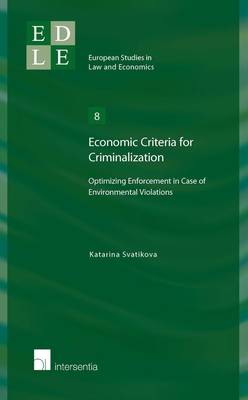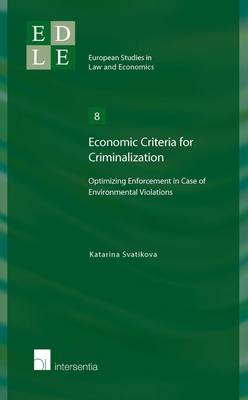
- Retrait gratuit dans votre magasin Club
- 7.000.000 titres dans notre catalogue
- Payer en toute sécurité
- Toujours un magasin près de chez vous
- Retrait gratuit dans votre magasin Club
- 7.000.0000 titres dans notre catalogue
- Payer en toute sécurité
- Toujours un magasin près de chez vous
Economic Criteria for Criminalization
Optimizing Enforcement in Case of Environmental Violations Volume 8
Katarina SvatikovaDescription
Why should criminal law be used to enforce environmental violations? Aren't administrative sanctions, particularly administrative fines, more efficient to use? This book examines the question why - from an economic perspective - society should enforce certain violations through criminal law, while others through private or administrative law. The findings of this analysis show that the enforcement through criminal law should be used only in limited circumstances, i.e. when (1) harm is large and/or immaterial and/or diffuse and/or remote; (2) stigma is desired; (3) the probability of detection is low; and (4) the criminal enforcement costs are sufficiently low. Under these circumstances, criminal enforcement seems to be the efficient instrument to use. This framework was applied to the enforcement of environmental violations in the United Kingdom, the Netherlands, Germany and the Flemish Region in Belgium. The empirical assessment of these four jurisdictions showed that there is definitely a role for administrative sanctions, which could be a cost-effective instrument to deal with environmental violations.
The relevant factors in assessing whether administrative fines are welfare enhancing are the distribution of abatement costs among firms, the marginal enforcement costs and the probability of detection and sanctioning. The analysis shows that in order to benefit from having two separate systems of laws, namely the criminal and the administrative, procedural differences should be maintained, since they have an economic justification.
About the author
Katarina Svatikova was a PhD researcher at the Erasmus University Rotterdam, taking part in the European Doctorate of Law and Economics (EDLE). She joined RILE (Rotterdam Institute of Law and Economics) after finishing her MSc degree in Economics and Law (cum laude) from the Utrecht University. She also holds a MA degree in International Relations and European Studies from the Central European University (Budapest), and a BA degree in Social Science (University College Utrecht). She currently works as a consultant in the energy & environmental field. This book corresponds to her doctoral thesis.
Spécifications
Parties prenantes
- Auteur(s) :
- Editeur:
Contenu
- Nombre de pages :
- 168
- Langue:
- Anglais
- Collection :
- Tome:
- n° 8
Caractéristiques
- EAN:
- 9781780680507
- Date de parution :
- 11-01-12
- Format:
- Livre broché
- Format numérique:
- Trade paperback (VS)
- Dimensions :
- 160 mm x 240 mm
- Poids :
- 362 g

Les avis
Nous publions uniquement les avis qui respectent les conditions requises. Consultez nos conditions pour les avis.






